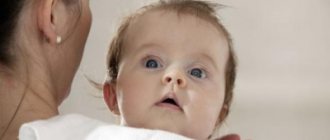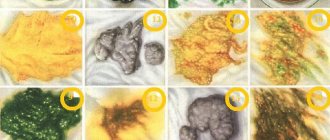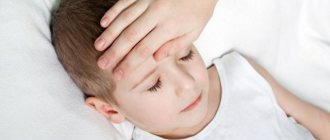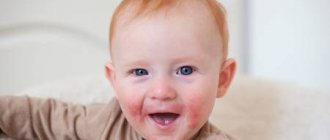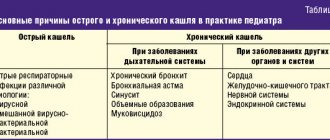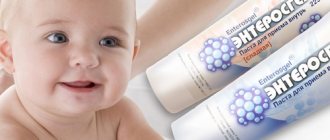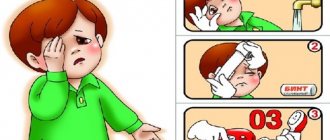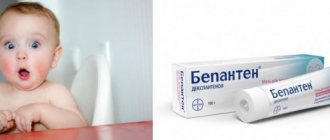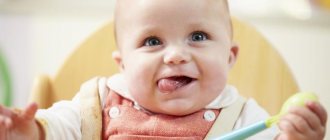Irritation from diarrhea in a child
Until about one year of age, a child’s stool may be loose and this is normal, but it happens that the child clearly has diarrhea. You could introduce a new product into your diet (if breastfeeding) or into your baby’s diet, which became the cause of the stool, but this is not the only possible reason. In general, there are several reasons for bowel dysfunction in a child:
- Food allergies;
- Changing formula or abrupt transition from breastfeeding to artificial feeding;
- The appearance of teeth.
In this case, it is important to exclude anything that affects the process itself and, of course, it is worth addressing the child’s digestion and eliminating the problem. Depending on the cause, you need to either eliminate the allergen, make the transition between feedings calmer, or eliminate diarrhea with the help of special medications. In any case, your pediatrician will help you both choose a medicine for diarrhea and determine what exactly caused it.
How to distinguish diarrhea from loose stools: symptoms of diarrhea
Watery stools often occur in breastfed babies, so you should find out the main signs of diarrhea in order to seek medical help in time. If you notice symptoms of diarrhea, you should contact your pediatrician immediately, as the disease develops quickly in infants and can lead to serious consequences. A few signs that will help distinguish diarrhea from normal stool:
- Loose stools in a breastfed baby occur spontaneously, the stool becomes like water, it contains particles of undigested food, and mucus and foam may also be observed. Even if the number of bowel movements is normal, but there is blood in the stool, this is a reason to immediately call an ambulance.
- The color of the stool becomes pink or red, this also indicates bleeding, and the temperature may rise; these signs indicate the need to consult a doctor.
- The smell of stool becomes pungent and very unpleasant, which indicates rotting food in the intestines.
- The child goes to the toilet more often; he can defecate about 12 times or more per day; this is not considered normal and requires consultation with a pediatrician.
- Signs also include redness of the skin around the anus, as bowel movements cause severe irritation.
If the diarrhea is mild, and the symptoms of diarrhea in a breastfeeding baby are not too pronounced, then the problem may go away on its own in just a couple of days, but the baby requires constant supervision. If the development of diarrhea in an infant is rapid and has pronounced symptoms, you should seek help.
Symptoms that should alert you include:
- Increased body temperature. If a baby has not only loose stools, but also a body temperature above normal, this may indicate an intestinal infection. The disease requires an immediate call to the ambulance; parents should not refuse hospitalization.
- The appearance of green stool. When the color of the stool changes to dark green, this indicates an infection, and there may also be pus in the stool.
- Attacks of vomiting and regurgitation. Another reason to immediately contact a doctor is that vomiting can cause rapid dehydration of the body.
- Stomach ache. If during bowel movements the baby begins to cry from pain, this may indicate intestinal obstruction and other problems.
- Pallor of the skin. This is quite a dangerous sign; if lethargy is added to it, you should consult a doctor as soon as possible.
- Sudden mood swings. A baby can play calmly, and then immediately cry, for no apparent reason. Also, the baby may be too sleepy and lethargic. All this indicates the need for a medical examination.
- Signs of dehydration. Diarrhea, which occurs more than 8 times a day, can lead to dehydration of the child’s body; this is especially dangerous for babies under one year old. At the first sign of dehydration, the mother should call an ambulance.
We recommend reading: Nervous tic in a child
If a breastfed baby has diarrhea, feeding should not be stopped, since the baby receives all the necessary microelements and water from milk. Parents should monitor the child’s well-being; this is the main criterion for loose stools. If a baby has diarrhea with mucus or white spots, but the child himself is active and cheerful, then there is no need to panic. Perhaps the mother’s diet is not suitable for the baby, or the newborn is not latching onto the breast correctly.
It often happens that colic in newborns causes diarrhea. To avoid colic, it is important to ensure that the baby captures most of the areola, and also to correctly formulate a diet for the mother.
How to treat irritation from diarrhea in a child
The very first and correct action in such a situation would be to create conditions under which the child comes into contact with feces for as little time as possible. This can become quite difficult because with diarrhea, the child's frequency of going to the toilet increases significantly. The main thing is that even a small appearance of feces should be eliminated quickly. Perhaps in such a situation it is worth switching from diapers to diapers (you can use disposable diapers) during the daytime, and checking the baby more often at night.
IMPORTANT! Be sure to minimize the amount of time diarrhea comes into contact with the skin to eliminate irritation from your baby's diarrhea.
When a child experiences irritation on his bottom from diarrhea , you should be more careful about washing it. Wash all folds especially carefully and thoroughly and wipe them dry. You should wash your baby using baby soap. Laundry soap also works well, as it is the most natural. But with its frequent use, dry skin may occur. After washing, use baby moisturizer or diaper cream, also thoroughly lubricating the baby’s entire bottom and groin area.
Itching and irritation
Of course, when a child has irritation on the bottom , it can be accompanied by itching and cause severe discomfort to the baby. Sometimes it happens that the child’s skin is so inflamed that washing and treating the child’s bottom with cream causes pain in the baby and, accordingly, crying, turning into hysterics. In this case, you should change the cream to a more complex composition (medicinal, recommended by your doctor) and take air baths .
When to urgently take your child to the doctor
Diarrhea in an infant is a serious sign of concern. The following circumstances may be a reason for immediately contacting a pediatrician:
- frequent vomiting;
- sudden loss of appetite;
- basal body temperature above 38 °C;
- diarrhea;
- the presence of blood in the stool;
- sunken fontanel;
- the appearance of rashes on the skin;
- slowing down weight gain;
- dry lips;
- crying without tears;
- apathy;
- drowsiness.
Irritation on a child's bottom from feces
When your child has irritation on his bottom from poop , carefully monitor his behavior. Make sure that the baby does not put his hands on his butt and under no circumstances scratch the irritated areas.
Sometimes irritation on the butt is caused by bacteria or fungus found in stool. This can happen if a child has dysbiosis. In this case, there is no way to do this without a doctor - he will prescribe treatment for the intestines and can prescribe an ointment for the baby that has an antifungal effect. But again, you should not self-medicate, because dysbiosis is a fairly serious disease and any delay in treatment can cause serious consequences.
Diet for diarrhea
Diet is critical for a child with diarrhea. Some foods will help relieve diarrhea symptoms, while others will make them worse.
If a child has acute symptoms of diarrhea, many advise avoiding consumption of coarse fiber because it promotes the formation of watery stools. But things are not quite like that. This largely depends on the type of dietary fiber consumed by the child:
- There is fiber that dissolves in water and is easily broken down in the intestines. These types of fibers are prebiotic, they slow the rate at which stool is passed out of the body, causing it to stick;
- Insoluble fiber is not absorbed by the body, but rather absorbs water as it passes through the digestive tract, thereby greatly softening the stool as it passes through the intestines.
Therefore, you will need to focus on foods with soluble fiber to help restore baby's intestinal flora to form harder stools.
During and shortly after an acute attack of diarrhea, diet should focus on:
- replacing lost fluids and electrolytes;
- eliminating certain foods that aggravate diarrhea, such as fried foods;
- Including easily digestible foods in your diet, such as plain rice.
Rehydration
Drinking fluids is very important when you have diarrhea to prevent dehydration and loss of vital electrolytes (sodium and potassium). Proper rehydration is especially important for children because they can die from dehydration in a short time.
While water is extremely important for preventing dehydration, it does not contain electrolytes. For children, doctors often recommend a special rehydration solution containing the microelements they need, which are lost with diarrhea. You can buy this solution at a pharmacy. Examples of rehydration solutions include:
Substances that reduce diarrhea
There are a number of natural products that can help reduce bouts of diarrhea. They all contain one or more of three active ingredients: tannin, pectin and vegetable glue.
- Tannins are chemicals that give some foods their hardness, which is their ability to bind and compress tissue. They stick to protein molecules in inflamed mucous membranes (i.e., irritable bowel in the case of diarrhea) and cause thickening of the bowel, which slows the absorption of toxins, helping the body retain fluids. Tannins are found in blackberry and raspberry leaves. Teas made from the leaves of these plants also replenish fluid lost from diarrhea, which is important for preventing dehydration. Be sure to include foods in your diet that contain real leaves and not just flavorings.
- Pectin is a type of soluble fiber that adds firmness to stool and soothes the digestive tract. Products rich in pectin that should be included in the diet are apples, bananas, carrots.
- Vegetable glue is another powerful type of fiber. It soothes the digestive tract and makes stool harder. Psyllium seeds are a generous source of this type of soluble fiber.
Super food for diarrhea
In fact, there is no food that will immediately stop diarrhea. But there are certain foods that can help reduce its symptoms.
- apples. The pulp and skin of apples are rich in pectin, so this fruit is one of the best foods for diarrhea. Apple pectin also helps with constipation because it does not soften the stool much;
- tea. The tannins in tea strengthen the mucous membrane in the intestines, which helps the body absorb fluid when there is minor inflammation in the intestinal tract. The tea should be brewed without any herbs, spices or milk;
- blueberries and blueberries. These berries work well for diarrhea because they are rich in both tannins and pectin. It is better to eat dried rather than fresh berries. And studies show that eating blueberries reduces the risk of developing colon cancer;
- carrot. Boiled carrots soothe the digestive tract and reduce diarrhea. Carrots are also high in nutrients that are lost during diarrhea;
- green onions, leeks, garlic. Eating foods rich in prebiotics (not to be confused with probiotics), which stimulate the growth of “good” bacteria in the gastrointestinal tract, can be helpful in preventing diarrhea. Natural sources of prebiotics include garlic, green onions, and leeks (they also have antiseptic properties). Eating plenty of these foods will strengthen your immune system and prevent the development of bacteria that cause diarrhea;
- White rice. White rice and products made from rice flour do not contain fiber. Thus, it helps to make the stool much harder;
- bananas. A ripe banana is often a baby's first food because it is soft and easy to digest, making it an ideal food for diarrhea. Bananas also contain a lot of potassium, which is lost through diarrhea;
- yogurt. Yogurt contains active bacteria such as L. thermophilus and L. bulgaricus, which help prevent and stop diarrhea. After several studies, yogurt has been proven to be effective in treating a number of digestive disorders.
The child has severe irritation from feces
If the irritation is so strong that it has reached the point of bleeding ulcers on the butt , then try, in addition to treatment with creams and other procedures, to provide the baby with lying or standing games. It often happens that due to severe pain, the baby cannot eat while sitting in a high chair. Or, on the contrary, due to severe irritation, the child refuses to walk and run a lot. In such cases, the child needs more attention to distract him from pain and discomfort, and the medicinal ointments have time to be absorbed and act. Try preparing activities for your baby to play while lying on his tummy.
Foods prohibited for diarrhea
Here are some foods you should avoid for diarrhea in children:
- Spicy dishes. Spices will irritate the gastrointestinal tract.
- Fried food. Added fats and oils can be harsh on a sensitive GI tract and are more likely to worsen symptoms.
- Sweets. Sugars entering the colon can destroy already sensitive bacteria, making diarrhea worse.
- Foods high in insoluble fiber. Fiber helps keep your digestive system functioning. This is usually good, but if you have diarrhea, insoluble fiber will make your symptoms worse.
Other foods not to eat:
- most processed foods (convenience foods);
- raw vegetables;
- products that lead to fermentation processes in the intestines: cauliflower, broccoli, white cabbage;
- fat meat;
- dairy products;
- citrus;
Feces during breastfeeding and artificial feeding
The color and consistency of a baby's stool depends on the way it is fed.
- Breast-feeding. Liquid, mushy and frequent stools with this type of diet are often confused by parents with diarrhea. The color of stool can be golden, yellow, or green. It depends on the diet of the nursing mother. If dairy products predominate in it, the color will be yellowish. If there is a lot of plant food in the diet, it is greenish. There may be cheesy lumps in the stool - this is normal. Feces have a characteristic sour odor.
- Artificial feeding. The color varies from pale yellow to light brown. It has a pasty, dense consistency and a more pronounced unpleasant odor.
The baby's feces will begin to thicken and acquire the properties of adult feces only after the introduction of complementary foods.
What to do if children are dehydrated
Dehydration is a lack of water in the body. There are several degrees of dehydration - from moderate to complete. When dehydrated, it is important to replenish the lack of not only water, but also vital salts and minerals.
The main causes of dehydration are diarrhea and vomiting. With diarrhea, stool becomes frequent and loose, but in the absence of diarrhea, the baby may not have stool at all. Other causes include excessive sweating and urination. At elevated temperatures, the body also loses moisture through skin evaporation.
Children on breastfeeding are less likely to suffer from dehydration; Remember that you can and should breastfeed while you are sick.
Does your baby pee often enough? (You should start to worry if you haven't changed a single diaper in 6 hours or have changed less than 8 diapers in 24 hours.)
Signs of dehydration in a baby:
- Very dry lips and mouth.
- Sunken eyes and fontanelle (soft area on the head).
- Dizziness.
- Lethargy.
- Dry, wrinkled or too loose skin.
- The baby pees less and less often.
- The baby cries almost without tears.
- Fever.
- Weight loss.
When to see a doctor
- If your baby has all of the above symptoms, but is too sleepy or overly excited.
- He continues to vomit or have diarrhea and cannot drink water.
- Treatment at home does not help.
- The baby begins to become dehydrated due to diabetes.
Treatment of dehydration
Breastfeed and formula feed your baby more often than usual, offer more fluids (ready-made electrolyte solutions are better). If your newborn is vomiting, give him a teaspoon (5 ml) as often as possible and gradually increase the volume of liquid. Do not offer your baby medicine immediately after a bout of vomiting; let him rest. The child must replenish the fluid that he loses during diarrhea or vomiting. The total volume depends on its weight.
| Weight | Approximate volume of solution |
| 2.7–4.5 kg | 470 ml/day |
| 5–10 kg | 680 ml/day |
| 10.5–11.8 kg | 1200 ml/day |
The most effective way to prevent the spread of viral infections is to wash your hands regularly and frequently.
